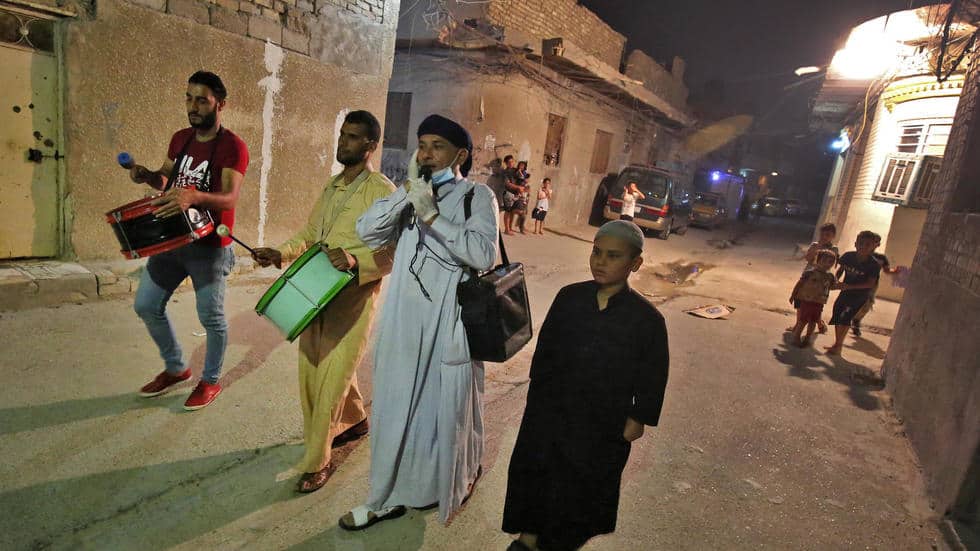The coronavirus pandemic has up-ended the Ramadan routine for Muslims around the world, and the Iraqi capital Baghdad is no exception. Its dusty streets would normally be bustling all night long, filled with fasters enjoying big feasts or worshippers on their way to the mosque.
Iraqi authorities have imposed a 5pm-5am curfew in order to curb Ramadan gatherings as they try to prevent the spread of COVID-19. This year, Sayyed Mozahem, his microphone and two drummers make their way around a neighborhood in old Baghdad, devoid of its usual pre-dawn crowd to wake people up for ‘suhoor,’ their last meal before Ramadan fasting rests at sunrise.
The local “musaharati’s” call, “fasters, wake up,” is amplified by his portable microphone and accompanied by the steady beat of traditional drums. In a riff on his usual reminder, and in light of the health crisis, Mozahem has added, “may Ramadan keep the coronavirus away,” and “God, spare Iraq from COVID-19,” to his normal wailing pre-dawn routine.
Mozahem is technically violating the dusk-to-dawn curfew, but has continued, as his older brother and father did before him, maintaining some semblance of normalcy and tradition in these strange times. Families in Old Baghdad however, have been forced to break with tradition and enjoy more modest iftar dinners at home, baking their own Ramadan sweets.
The call to prayer rings out as it does everyday, but the city’s mosques remain closed and Baghdadis are forced to complete their prayers, quietly at home.
In the glaring, hot daylight hours Baghdad is quiet, even for Ramadan, but the relative quiet is regularly punctuated by COVID-19 warnings broadcast from firefighter Moussa Al-Bedeiri’s megaphone.
“As the coronavirus spread, our work has doubled. We had more sanitization campaigns and broadcasts of official guidelines through loudspeakers on the civil defense vehicles and at our center,” he told AFP.
For the city’s food sector, business is slow even though restaurants can once again open for delivery after a two month coronavirus shutdown. The country’s oil-reliant economy is expected to contract by five per cent this year, a contraction already being felt by delivery driver Mortada.
Consumer confidence and spending are down, and as a result, Mortada reports he is making just a quarter of the deliveries he normally would during the Muslim holy month.
The isolation of this year’s cloistered Ramadan is being felt by all, but it has been particularly hard on sheikh Yalmaz Youssef, who laments the closure of Abdelqader Al-Gailani mausoleum and mosque.
“Since the ‘70s and until this day, I have never seen the door of the holy shrine of Sheikh Abdelqader closed. But when I did, I cried,” 70-year-old Youssef said.
Iraq’s novel coronavirus death count stands at 134, amid 3724 confirmed cases according to the World Health Organization’s data. The Ramadan curfew has no doubt helped slow the spread of COVID-19 and given the country’s ailing health system a chance to cope with the public health crisis.
The growing economic crisis, fed by a contraction in spending and low oil prices may yet prove more deadly, with the World Bank predicting Iraq’s poverty rate could double as a result.

